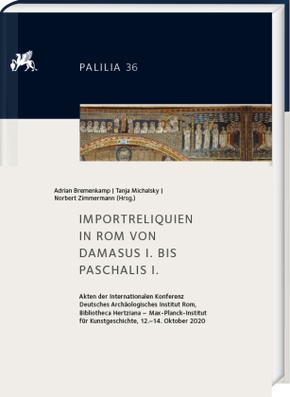Importreliquien in Rom von Damasus I. bis Paschalis I. - Internationale Konferenz Deutsches Archäologisches Institut Rom -Bibliotheca Hertziana, Max-Planck-Institut für Kunstgeschichte, 12.-14. Oktober 2020
| Verlag | Harrassowitz |
| Auflage | 2023 |
| Seiten | 250 |
| Format | 25,9 x 2,1 x 28,1 cm |
| Gewicht | 1376 g |
| Reihe | Palilia 036 |
| ISBN-10 | 3447119462 |
| ISBN-13 | 9783447119467 |
| Bestell-Nr | 44711946A |
Obwohl Rom durch seinen Reichtum an Reliquien alle anderen Städte des Römischen Reiches bei weitem übertraf, wurden schon bald weitere Reliquien von auswärtigen Heiligen nach Rom importiert und in die römische Kultpraxis und Kultlandschaft integriert. Fund, Bergung, Transport, Empfang und Niederlegung der importierten Reliquien wurden aufwendig inszeniert und medial memoriert. Die in diesem Band versammelten Beiträge behandeln das hagiographische Profil der importierten Heiligen, die Veränderungen in der sakralen Topographie der Stadt, die Kodifizierungen neuer Formen des Reliquienkults als Folge des Imports, die Verwendung künstlerischer Medien und nicht zuletzt die Motivationen der involvierten Akteure.In its wealth of relics, Rome surpassed all other cities of the Roman Empire by far; yet it did not take long for relics of foreign saints to be imported into Rome and integrated into the cult practice and sacred topography of the city. The discovery, salvage, transport, reception and deposition of these imported relics were elaborately staged and commemorated in a variety of media. The contributions collected in this volume deal with the hagiographic profile of the imported saints, the changes in the sacred topography of the city, the codifications of new forms of relic cult as a result of their import, the use of artistic media, and, last but not least, the motivations of the actors involved.Roma superava notevolmente tutte le altre città dell'Impero per il numero di reliquie in essa custodite. Proprio per questo è interessante il fenomeno dell'importazione delle reliquie di santi stranieri, che una volta accolte a Roma vengono integrate nella pratica e nell'universo liturgico locale. La scoperta, il recupero, il trasporto, l'accoglienza e infine la deposizione ricevono un'enfasi particolare, mentre la memoria di questi eventi è valorizzata attraverso varie espressioni artistiche. I contributi raccolti in questo volume trattano il profilo agiografico dei santi importati, i cambiamenti nella topografia sacra della città, la tipizzazione di nuove forme di culto in relazione alle reliquie importate, l'uso di mezzi artistici e le motivazioni degli attori coinvolti.

